|
|
|
|
|
|
|
|
|
ISAR-5 Fifth International Symposium on Arctic Research, January 15-18, 2018 (Tokyo, Japan). The fifth ISAR has been planned at the recommendation of the science steering committee of ISAR-4, which was held in Toyama, Japan in April 2015. The fifth ISAR will be devoted to discussions on environmental changes in the Arctic and their regional and global implications, to seek additional international scientific collaboration in this area by gathering, synthesizing and sharing information related to these changes occurring in the Arctic. Special emphasis will be placed on the fields of the social sciences and humanities, which were not included in the previous ISARs. ISAR-5 will consist of general sessions and special sessions. The general sessions will address the following topics: atmosphere; ocean and sea ice; rivers, lakes, permafrost, and snow cover; ice sheets, glaciers, and ice cores; terrestrial ecosystems; marine ecosystems; geospace; policies and economy; and social and cultural dimensions. Special sessions will be solicited on cross-cutting themes.
|
Media
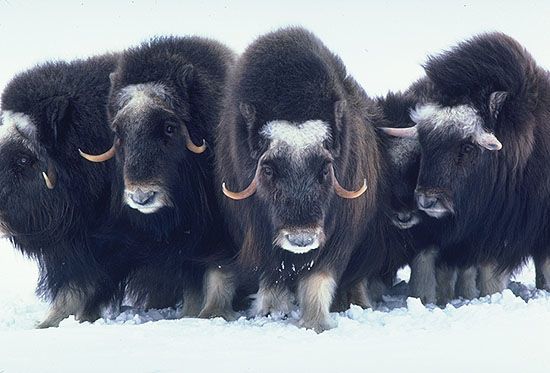 In the Arctic, More Rain May Mean Fewer Musk Oxen. In the Arctic, More Rain May Mean Fewer Musk Oxen. It's hard to miss a musk ox: It looks like a buffalo decked out in a hairy fur coat. And yet this easy-to-spot giant, which lives on tundras from Siberia to Greenland, is still surprisingly mysterious. "Here is the largest land mammal of the polar zones, but we hardly know anything about musk oxen," said Joel Berger, a wildlife biologist at Colorado State University and a senior scientist at the Wildlife Conservation Society. New York Times
Strange Weather Trigged Bacteria That Killed 200,000 Endangered Antelope. Over the span of three weeks in 2015, more than 200,000 saiga antelope suddenly died in central Kazakhstan. Scientists knew that bacteria called Pasteurella multocida type B caused the mass death. Now, new research suggests that the bacteria was already present in the animals; it was triggered and became harmful because of a period of unusual weather. Richard Kock, a professor of Wildlife Health and Emerging Diseases at The Royal Veterinary College, witnessed the "rapidly accelerating death." National Public Radio
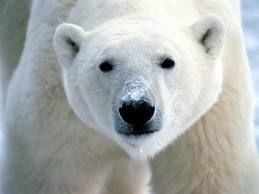 Public Hearings Wrap Up for 2018-2019 Western Hudson Bay Polar Bear Quota. Public Hearings Wrap Up for 2018-2019 Western Hudson Bay Polar Bear Quota. A public hearing to determine the 2018-19 hunting quota for Western Hudson Bay polar bears in Nunavut wrapped up in Rankin Inlet, Nunavut last week. In September last year, Nunavut's environment minister at the time, Joe Savikataaq, accepted the Nunavut Wildlife Management Board's recommendation to increase the total allowable harvest to 34 bears for the 2017-18 harvest season. The initial quota was 28 for the season. CBC News
Weather Anomalies Accelerate the Melting of Sea Ice. In the winter of 2015/16, something happened that had never before been seen on this scale: at the end of December, temperatures rose above zero degrees Celsius for several days in parts of the Arctic. Temperatures of up to eight degrees were registered north of Svalbard. Temperatures this high have not been recorded in the winter half of the year since the beginning of systematic measurements at the end of the 1970s. As a result of this unusual warmth, the sea ice began to melt. Science Daily
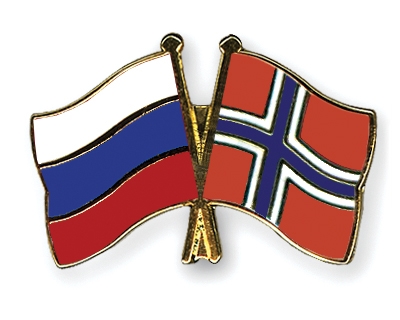 Norway Must Prepare for Arctic Oil Race With Russia. Norway Must Prepare for Arctic Oil Race With Russia. Norway must identify potential offshore oil and gas reserves near its northern maritime border with Russia to better protect its economic interest in the remote Arctic region, energy minister Terje Soeviknes said Jan. 17. The two countries agreed in 2010 to split previously disputed areas of the Barents Sea between them, allowing each to exploit resources hidden beneath the seabed. An increase in drilling activity on the Russian side of the border should lead Norway to push its own agenda, the minister said. E&P Magazine
|
|
Future Events
Alaska Region Climate Outlook Briefing, January 19, 2018 (Fairbanks, Alaska USA/ webinar). This event is sponsored by the Alaska Center for Climate Assessment and Policy. This webinar will review recent conditions and current state of the climate system in and near Alaska and the status of important global climate drivers, review guidance available for the monthly and seasonal scale outlooks and finish up the official outlooks by NOAA's Climate Prediction Center.
2018 Arctic Frontiers: Connecting the Arctic, January 21-26, 2018 (Tromso, Norway). Arctic Frontiers is an international arena on sustainable development in the Arctic. The conference addresses the management of opportunities and challenges to achieve viable economic growth with societal and environmental sustainability. Arctic Frontiers brings academia, government and business together to create a firmer foundation for decision-making and sustainable economic development in the Arctic. Join the Arctic Frontiers conference preparing the new Arctic future. The conference takes place the fourth week of January in the Norwegian city of Tromsø, known as the Gateway to the Arctic.
Alaska Marine Science Symposium, January 22-26, 2018 (Anchorage, Alaska.) The Alaska Marine Science Symposium (AMSS) is Alaska's premier marine research conference. For over 20 years, it has brought together scientists, educators, resource managers, students, and the public to discuss marine research conducted in Alaskan waters. Over 700 people attend this 4-day long conference held annually in January. Each day of the conference highlights Alaskan marine ecosystems: Bering Sea & Aleutian Islands (Wednesday), and the Gulf of Alaska (Tuesday), and Arctic (Thursday). Research topics discussed range from ocean physics, fishes and invertebrates, seabirds, marine mammals, to local traditional knowledge. Website for 2018 meeting is here.
** New this week ** Climate Change and Health in the Arctic: Impacts on Alaska Native Communities and a Spotlight on Efforts to Improve Climate Health, January 25, 2018 (Webinar). Climate warming in the Arctic is occurring twice as fast as the global average. Although Alaska Native peoples are resilient, live in one of the most severe climates on earth, and have adapted to varying conditions throughout history, current changes to climate are rapid and extreme. These changes are severely impacting the lives and communities of Alaska Natives, since many people in Arctic villages live close to the land and rely on subsistence lifestyles. During this webinar, learn more about climate change in the Arctic, how it is affecting the health of indigenous people, and various types of work occurring in this space - including state and local efforts and a spotlight on an NIHB-funded grant for the Village of Wainwright. The presentation will also include resources for climate change and climate health in the Arctic.
Alaska Forum on the Environment, February 12-16, 2018 (Anchorage, Alaska)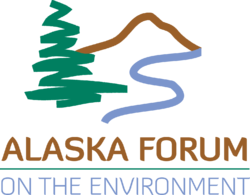 . AFE is a statewide gathering of environmental professionals from government agencies, non-profit and for-profit businesses, community leaders, Alaskan youth, conservationists, biologists and community elders. The diversity of attendees sets this conference apart from any other. The 2018 event will be our 20th year providing a strong educational foundation for all Alaskans and a unique opportunity to interact with others on environmental issues and challenges. . AFE is a statewide gathering of environmental professionals from government agencies, non-profit and for-profit businesses, community leaders, Alaskan youth, conservationists, biologists and community elders. The diversity of attendees sets this conference apart from any other. The 2018 event will be our 20th year providing a strong educational foundation for all Alaskans and a unique opportunity to interact with others on environmental issues and challenges.
Methane Variation Over Terrestrial and Marine Arctic Areas (2010-2016): IASI Satellite Data, March 13, 2018 (Silver Spring, Maryland USA). There is evidence that methane is being released into the atmosphere at high northern latitudes as the Arctic warms up. Methane concentration in the Arctic lower troposphere was estimated between 2010 and 2016 with the Infrared Atmospheric Sounding Interferometer (IASI), a thermal IR spectrometer orbiting the Earth on a satellite MetOp-A. The area studied encompasses the Barents/ Kara seas and the Wester Siberian Lowland (WSL), one of the most important methane sources in high northern latitudes. This event is a NOAA's National Ocean Service Science Seminar.
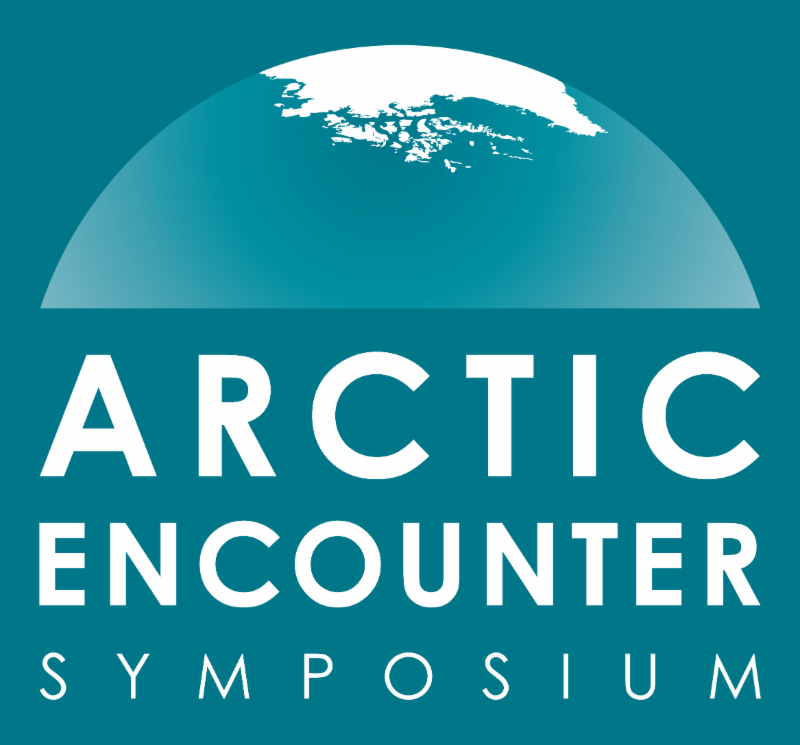 5th Annual Arctic Encounter Symposium (AES), April 19-20, 2018 (Seattle, WA, USA) 5th Annual Arctic Encounter Symposium (AES), April 19-20, 2018 (Seattle, WA, USA) - The Arctic Encounter, the largest annual Arctic policy conference in the U.S., will convene policymakers, industry leaders, scientists, Arctic artists and musical performers, and other stakeholders to debate and discuss emerging Arctic challenges and opportunities including policy, innovation, security, and development. The mission of AES is to raise awareness, engage challenges, and develop solutions for the future of the Arctic region and the people who live there. The 5th annual AES will take place in downtown Seattle at the Bell Harbor International Conference Center on Pier 66.
2018 North by North Festival, April 23-29, 2018 (Anchorage, Alaska USA). The North by North Festival captures the spirit of Alaska and the Arctic - to address our challenges and opportunities with Northern innovation and resilience, to build on a rich history and to ensure a future full of promise. The Festival is for the North, and organized by Northerners, with goals of sustainability, livability and growth. The Festival brings innovators from across Alaska, the nation and other Arctic regions to collaborate and address local and circumpolar challenges. Through knowledge, governance, business, design, film, music, food, literature and art, we celebrate the North.
The Effects of Climate Change on the World's Oceans, June 4-8, 2018 (Washington, DC USA). The 4th International Symposium will bring together experts from around the world to better understand climate impacts on ocean ecosystems - and how to respond. The event is hosted by a variety of groups including International Council for the Exploration of the Sea (ICES), N. Pacific Marine Science Organization (PICES), Intergovernmental Oceanographic Commission of UNESCO (IOC), and Food and Agriculture Organization of the United Nations (FAO).
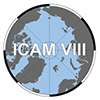
International Conference on Arctic Margins (ICAM) VIII, June 11-14, 2
The international Conference on Arctic Margins (ICAM) is a forum for earth scientists who study the Arctic. It was founded to help understand the little known Arctic geology and to foster cooperation and collaboration among Arctic researchers. There have been 7 meetings since its inception in 1991. See here for more information.
 POLAR 2018, June 15-27, 2018 (Davos, Switzerland). POLAR2018 is a joint event from the Scientific Committee on Antarctic Research (SCAR) and the International Arctic Science Committee (IASC). The SCAR meetings, the ASSW and the Open Science Conference will be hosted by the Swiss Federal Institute for Forest, Snow and Landscape Research WSL under the patronage of the Swiss Committee on Polar and High Altitude Research. The WSL Institute for Snow and Avalanche Research SLF is organizing POLAR2018. POLAR 2018, June 15-27, 2018 (Davos, Switzerland). POLAR2018 is a joint event from the Scientific Committee on Antarctic Research (SCAR) and the International Arctic Science Committee (IASC). The SCAR meetings, the ASSW and the Open Science Conference will be hosted by the Swiss Federal Institute for Forest, Snow and Landscape Research WSL under the patronage of the Swiss Committee on Polar and High Altitude Research. The WSL Institute for Snow and Avalanche Research SLF is organizing POLAR2018.
Arctic Observing Summit 2018, June 24-26, 2018 (Davos, Switzerland). The Arctic Observing Summit (AOS) is a high-level biennial summit that provides a platform to address urgent and broadly recognized needs of Arctic observing across all components of the Arctic system. AOS 2018 will be held in Davos, Switzerland ( June 24-26) and will focus on pressing issues in the implementation and support of sustained observations that can be addressed through a business-case lens. To that end, short submissions are requested that address any and all aspects of the overarching theme and sub-themes. Additional information can be found here.
17th International Congress of Circumpolar Health (ICCH17), August 12-15, 2018 (Copenhagen, Denmark). The ICCH congresses are held every third year in different locations in the circumpolar area and represent the largest scientific meetings worldwide on circumpolar health. The ICCH congresses serve as the primary source of information exchange and scholarly communication in issues relating to circumpolar health. More than 750 participants generally register and participate in each Congress, and more than 400 scientific papers or posters are usually presented.
UArctic Congress 2018, September 3-7, 2018 (Oulu and Helsinki, Finland).
The UArctic Congress 2018 will bring together key UArctic meetings and a science conference into one single gathering, including business meetings of the Council of UArctic, Rectors' Forum, Student Forum, and Thematic Networks & UArctic Institutes Leadership Team. The Congress is an integral part of the Finland's Arctic Council chairmanship program, and open to the public. The event will highlight the themes and priorities of the Finnish chairmanship, including the goals of the United Nations' 2030 Agenda for Sustainable Development, and the Paris Agreement under the UN Framework Convention on Climate Change.
The second Arctic Biodiversity Congress is hosted by the Conservation of Arctic Flora and Fauna (CAFF), the biodiversity working group of the Arctic Council, and the Ministry of the Environment, Finland. The second Arctic Biodiversity Congress will build on the success of the first Congress, held in 2014 in Trondheim, Norway, and will bring together scientists, policymakers government officials, Indigenous representatives, Traditional Knowledge holders, industry, non-governmental organizations, and others to promote the conservation and sustainable use of Arctic biodiversity.
|
|

  
4350 N. Fairfax Drive, Suite 510
Arlington, VA 22203, USA
External links in this publication, and on the USARC's World Wide Web site ( www.arctic.gov) do not constitute endorsement by the US Arctic Research Commission of external Web sites or the information, products or services contained therein. For other than authorized activities, the USARC does not exercise any editorial control over the information you may find at these locations. These links are provided consistent with the stated purpose of this newsletter and the USARC Web site.
|
|
|
|
|
|
|
|
|
 In the Arctic, More Rain May Mean Fewer Musk Oxen. It's hard to miss a musk ox: It looks like a buffalo decked out in a hairy fur coat. And yet this easy-to-spot giant, which lives on tundras from Siberia to Greenland, is still surprisingly mysterious. "Here is the largest land mammal of the polar zones, but we hardly know anything about musk oxen," said Joel Berger, a wildlife biologist at Colorado State University and a senior scientist at the Wildlife Conservation Society. New York Times
In the Arctic, More Rain May Mean Fewer Musk Oxen. It's hard to miss a musk ox: It looks like a buffalo decked out in a hairy fur coat. And yet this easy-to-spot giant, which lives on tundras from Siberia to Greenland, is still surprisingly mysterious. "Here is the largest land mammal of the polar zones, but we hardly know anything about musk oxen," said Joel Berger, a wildlife biologist at Colorado State University and a senior scientist at the Wildlife Conservation Society. New York Times Public Hearings Wrap Up for 2018-2019 Western Hudson Bay Polar Bear Quota. A public hearing to determine the 2018-19 hunting quota for Western Hudson Bay polar bears in Nunavut wrapped up in Rankin Inlet, Nunavut last week. In September last year, Nunavut's environment minister at the time, Joe Savikataaq, accepted the Nunavut Wildlife Management Board's recommendation to increase the total allowable harvest to 34 bears for the 2017-18 harvest season. The initial quota was 28 for the season. CBC News
Public Hearings Wrap Up for 2018-2019 Western Hudson Bay Polar Bear Quota. A public hearing to determine the 2018-19 hunting quota for Western Hudson Bay polar bears in Nunavut wrapped up in Rankin Inlet, Nunavut last week. In September last year, Nunavut's environment minister at the time, Joe Savikataaq, accepted the Nunavut Wildlife Management Board's recommendation to increase the total allowable harvest to 34 bears for the 2017-18 harvest season. The initial quota was 28 for the season. CBC News Norway Must Prepare for Arctic Oil Race With Russia. Norway must identify potential offshore oil and gas reserves near its northern maritime border with Russia to better protect its economic interest in the remote Arctic region, energy minister Terje Soeviknes said Jan. 17. The two countries agreed in 2010 to split previously disputed areas of the Barents Sea between them, allowing each to exploit resources hidden beneath the seabed. An increase in drilling activity on the Russian side of the border should lead Norway to push its own agenda, the minister said. E&P Magazine
Norway Must Prepare for Arctic Oil Race With Russia. Norway must identify potential offshore oil and gas reserves near its northern maritime border with Russia to better protect its economic interest in the remote Arctic region, energy minister Terje Soeviknes said Jan. 17. The two countries agreed in 2010 to split previously disputed areas of the Barents Sea between them, allowing each to exploit resources hidden beneath the seabed. An increase in drilling activity on the Russian side of the border should lead Norway to push its own agenda, the minister said. E&P Magazine






